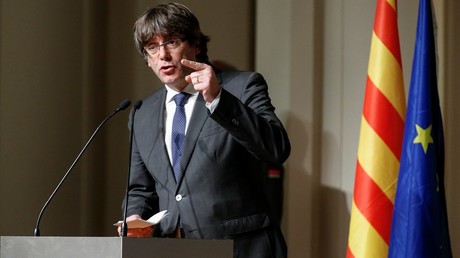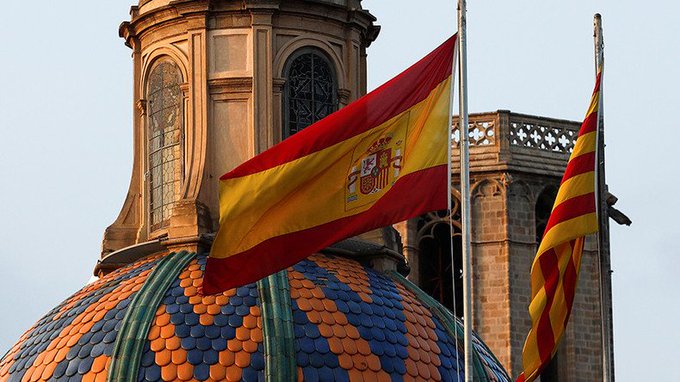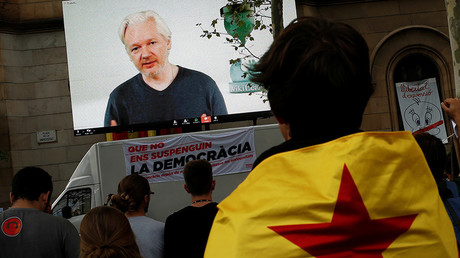Spanish cyber intelligence finds no evidence of Russian cyber attacks in Catalan crisis
No Moscow-linked intrusion was detected during the Catalonia crisis, Spain’s cyber intelligence unit has announced. Earlier, Madrid decried cyber attacks as part of Russia’s alleged wider online effort to support Catalan independence.
Spanish public administration websites have suffered dozens of cyber attacks in recent months. In just ten days following the application of Article 155 of Spain’s constitution – which imposed direct rule on Catalonia on October 27 – the Spanish National Cryptologic Center (CCN) registered around 70 attacks. However, none of the detected attacks originated from Russia or any other state, Luis Jimenez, General Deputy Director of the National Intelligence Center (CNI) and the head of cybersecurity at CCN, Javier Candau, told Europa Press.
"The research has shown that these have been low-level attacks, which have been discussed on various forums on social media, related to hackers groups, in various EU countries and outside the bloc. All these actions by no means have been connected with cyberattacks, authorized by governments," the center told Sputnik.
The attacks likely originated from cybercriminals and activists, authorities conceded, emphasizing that only 15 percent of the attempts had any degree of success. Two attacks presented some danger as they tried to unsuccessfully steal information or paralyze government websites. One breach managed to block the Constitutional Court's website for about 30 minutes, and was orchestrated by the so-called 'Operation Free Catalonia' activist group, Spanish intelligence revealed.
Earlier this month, Spanish Defense Minister Maria Dolores de Cospedal told reporters that Madrid had established that “many messages and interventions via social networks come from Russian territory.”
“Russia's interference in preparing messages that could alter the internal workings of some countries,” she said, echoing a statement by the Foreign Minister, who said Spain has “proof” that malicious cyber activity was coming from “Russian network hackers.”
The wave of anti-Russian hysteria, which reached epic proportions in the wake of the alleged “Russian meddling” in US elections last year, also penetrated other upper levels of the Spanish government. Spain’s government spokesman Inigo Mendez de Vigo promised to kick the issue up to EU level.
Madrid is under the impression, or rather the illusion, that Russian state actors and private groups allegedly used Twitter, Facebook and other sites to publicize and promote the separatist cause and swing public opinion in the process. However, the Spanish cyber team detected no possible meddling in the crisis by way of massive messaging campaigns on social networks.
And just as was the case with the rest of similar baseless allegations ventilated by the US, France, and Germany, Moscow, in what is fast becoming a tedious routine, underlined that it does not interfere in the affairs of sovereign nations.
“We deeply regret the fact that the anti-Russian campaign unleashed by Western media has, this time, taken hold in Madrid at the official level in the context of the Catalan crisis,” Foreign Ministry spokeswoman, Maria Zakharova said last week. “We would like our Spanish colleagues to start taking responsibility for their words and offer concrete evidence. It is absolutely unclear what considerations could have prompted the Spanish minister to make these 'revelations'.”
In fact, Madrid itself has been accused by freedom of speech activists, including Julian Assange, of shutting down or censoring the Catalan regional government and local pro-independence movements, ahead, during and after the crisis in Catalonia. The cyber crackdown also evolved into the physical suppression of speech by the Spanish authorities, who coerced local politicians and civil society from preparing and then staging the independence referendum. The massive crackdown on voters during the plebiscite on October 1, which left almost 900 people injured, did not prevent Catalan authorities from unilaterally declaring independence on October 27.
In response, the Spanish Senate triggered Article 155, stripping the regional authorities of power. The government of Prime Minister Mariano Rajoy then suspended the Catalan government and its president while arresting dissenting local officials for their roles in the separatist movement. Madrid announced that elections will be held in the region on December 21.




0 Comments:
Post a Comment
Subscribe to Post Comments [Atom]
<< Home